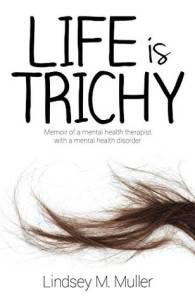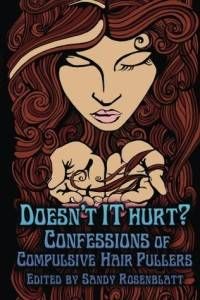
A Trichy Pull-List: Best Books on Compulsive Hair-Pulling
May is Mental Health Awareness Month, and one disorder that needs more awareness is trichotillomania. What? Trichotillomania. Trick-oh-till-oh-mania. Got that? It’s compulsive hair-pulling. The Trichotillomania Learning Center says 1 or 2 in 50 people experience it at some point in their lives, yet there’s quite a bit of silence and stigma around it.
Essays have been popping up on sites like Narratively and xoJane every few months. YouTuber Beckie0’s 15-minute long video about her trich went viral after Upworthy picked it up a year or so ago.
But, being the bookworm I am — and one who has spent most of her reading life with books about mental illness — I am not satisfied. I want to read books about real people with this affliction I have also dealt with for most of my (reading) life.
Here are some of the best books I’ve smuggled from my library to try to learn about others’ experiences and how to cure this so-called incurable disorder. There are lots of books about the psychology of it, and how to be a therapist for patients with it, and how to be a nice parent to a child who pulls out their hair, and workbooks on how you yourself can trick yourself into stopping. That’s not what these are. These are real people telling their stories, with the hope of getting more people to come out and tell their stories, too.
 Life is Trichy: Memoir of a Mental Health Therapist with a Mental Health Disorder by Lindsey Muller. This is the first memoir I found on trichotillomania. Lindsey was born a perfectionist and spent her childhood picking at her arms and legs. When she got older, she started going after her hair. And it didn’t stop. This short book (140ish pages) had me on the edge of my seat and feeling like I was reading my own journals. I had tears in my eyes as I highlighted pages for myself to throw into my commonplace book.
Life is Trichy: Memoir of a Mental Health Therapist with a Mental Health Disorder by Lindsey Muller. This is the first memoir I found on trichotillomania. Lindsey was born a perfectionist and spent her childhood picking at her arms and legs. When she got older, she started going after her hair. And it didn’t stop. This short book (140ish pages) had me on the edge of my seat and feeling like I was reading my own journals. I had tears in my eyes as I highlighted pages for myself to throw into my commonplace book.
She’s also a therapist, so she has some insights on practices to stop, or at the very least, not feel ashamed.
 Doesn’t It Hurt?: Confessions of Compulsive Hair Pullers by Sandy Rosenblatt (Editor). An excellent collection of essays by a group of diverse people who all have one thing in common. Their stories all follow the same timeline: No recollection of the first pull, growing up shamefully hiding their heads/eyelids/eyebrows, finding out they’re not alone, finding peace and acceptance with the disorder.
Doesn’t It Hurt?: Confessions of Compulsive Hair Pullers by Sandy Rosenblatt (Editor). An excellent collection of essays by a group of diverse people who all have one thing in common. Their stories all follow the same timeline: No recollection of the first pull, growing up shamefully hiding their heads/eyelids/eyebrows, finding out they’re not alone, finding peace and acceptance with the disorder.
As with any essay collection, some really spoke to me. Not only because they were so relatable, but because some really strong and powerful people suffer from this thing, too. It’s almost like a collection of secret friends.
 Marni: My True Story of Stress, Hair-Pulling, and Other Obsessions by Marni Bates. This reads like a YA novel, but it’s a memoir. It wasn’t my favorite, but it was so comforting to find. It’s especially great to have it told through the eyes of a teenager, because most sufferers begin as teens.
Marni: My True Story of Stress, Hair-Pulling, and Other Obsessions by Marni Bates. This reads like a YA novel, but it’s a memoir. It wasn’t my favorite, but it was so comforting to find. It’s especially great to have it told through the eyes of a teenager, because most sufferers begin as teens.
A passage that resonated with me, and still gives me goosebumps: “When I stared at the mirror and tried to recognize the girl without eyebrows, eyelashes, and bangs as myself and failed, I knew something had gone horribly wrong. It’s hard to recognize yourself when you’ve pulled at your eyebrows so consistently that there is almost nothing left. It’s hard to believe you could have done something so destructive to your face, and that tomorrow you have to go to school pretending nothing is different.”
Yeah. That could have been pulled (heh) from my journals.
Bonus: I made a list on Goodreads of anything pertaining to trich and other body-focused repetitive behaviors I could find. If there are any I’ve missed, let me know in the comments or add them to the list!
Oh, and if you’re in need of support, Trichotillomania Learning Center is the place to go.





